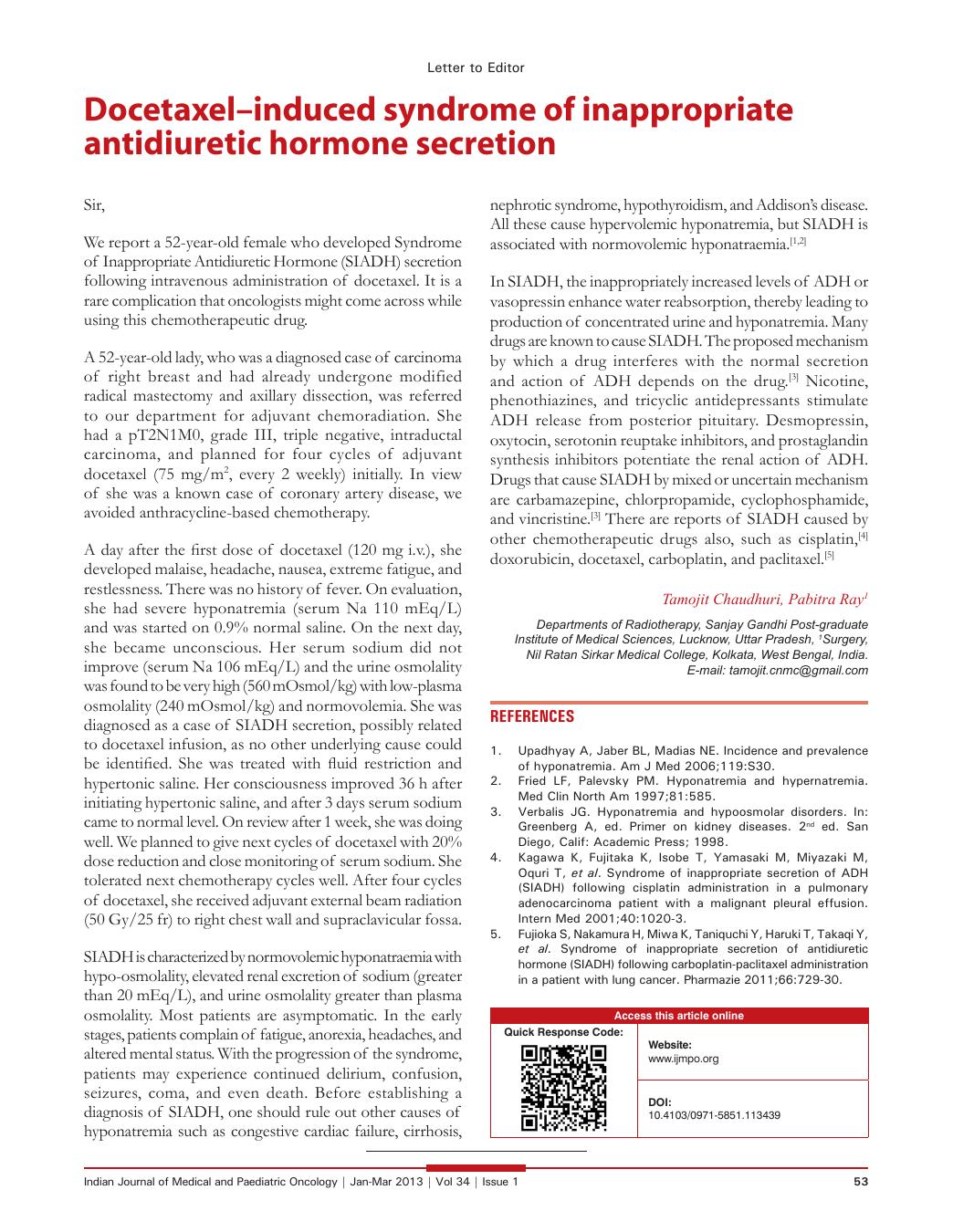Docetaxel-induced syndrome of inappropriate antidiuretic hormone secretion
CC BY-NC-ND 4.0 · Indian J Med Paediatr Oncol 2013; 34(01): 53
DOI: DOI: 10.4103/0971-5851.113439

Publication History
Article published online:
20 July 2021
© 2013. Indian Society of Medical and Paediatric Oncology. This is an open access article published by Thieme under the terms of the Creative Commons Attribution-NonDerivative-NonCommercial-License, permitting copying and reproduction so long as the original work is given appropriate credit. Contents may not be used for commercial purposes, or adapted, remixed, transformed or built upon. (https://creativecommons.org/licenses/by-nc-nd/4.0/.)
Thieme Medical and Scientific Publishers Pvt. Ltd.
A-12, 2nd Floor, Sector 2, Noida-201301 UP, India
Sir,
We report a 52-year-old female who developed Syndrome of Inappropriate Antidiuretic Hormone (SIADH) secretion following intravenous administration of docetaxel. It is a rare complication that oncologists might come across while using this chemotherapeutic drug.
A 52-year-old lady, who was a diagnosed case of carcinoma of right breast and had already undergone modified radical mastectomy and axillary dissection, was referred to our department for adjuvant chemoradiation. She had a pT2N1M0, grade III, triple negative, intraductal carcinoma, and planned for four cycles of adjuvant docetaxel (75 mg/m2, every 2 weekly) initially. In view of she was a known case of coronary artery disease, we avoided anthracycline-based chemotherapy.
A day after the first dose of docetaxel (120 mg i.v.), she developed malaise, headache, nausea, extreme fatigue, and restlessness. There was no history of fever. On evaluation, she had severe hyponatremia (serum Na 110 mEq/L) and was started on 0.9% normal saline. On the next day, she became unconscious. Her serum sodium did not improve (serum Na 106 mEq/L) and the urine osmolality was found to be very high (560 mOsmol/kg) with low-plasma osmolality (240 mOsmol/kg) and normovolemia. She was diagnosed as a case of SIADH secretion, possibly related to docetaxel infusion, as no other underlying cause could be identified. She was treated with fluid restriction and hypertonic saline. Her consciousness improved 36 h after initiating hypertonic saline, and after 3 days serum sodium came to normal level. On review after 1 week, she was doing well. We planned to give next cycles of docetaxel with 20% dose reduction and close monitoring of serum sodium. She tolerated next chemotherapy cycles well. After four cycles of docetaxel, she received adjuvant external beam radiation (50 Gy/25 fr) to right chest wall and supraclavicular fossa.
SIADH is characterized by normovolemic hyponatraemia with hypo-osmolality, elevated renal excretion of sodium (greater than 20 mEq/L), and urine osmolality greater than plasma osmolality. Most patients are asymptomatic. In the early stages, patients complain of fatigue, anorexia, headaches, and altered mental status. With the progression of the syndrome, patients may experience continued delirium, confusion, seizures, coma, and even death. Before establishing a diagnosis of SIADH, one should rule out other causes of hyponatremia such as congestive cardiac failure, cirrhosis, nephrotic syndrome, hypothyroidism, and Addison's disease. All these cause hypervolemic hyponatremia, but SIADH is associated with normovolemic hyponatraemia.[1,2]
In SIADH, the inappropriately increased levels of ADH or vasopressin enhance water reabsorption, thereby leading to production of concentrated urine and hyponatremia. Many drugs are known to cause SIADH. The proposed mechanism by which a drug interferes with the normal secretion and action of ADH depends on the drug.[3] Nicotine, phenothiazines, and tricyclic antidepressants stimulate ADH release from posterior pituitary. Desmopressin, oxytocin, serotonin reuptake inhibitors, and prostaglandin synthesis inhibitors potentiate the renal action of ADH. Drugs that cause SIADH by mixed or uncertain mechanism are carbamazepine, chlorpropamide, cyclophosphamide, and vincristine.[3] There are reports of SIADH caused by other chemotherapeutic drugs also, such as cisplatin,[4] doxorubicin, docetaxel, carboplatin, and paclitaxel.[5]


 PDF
PDF  Views
Views  Share
Share

